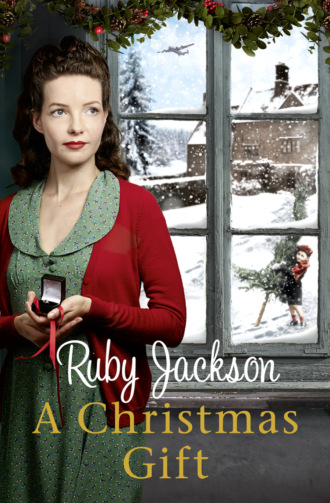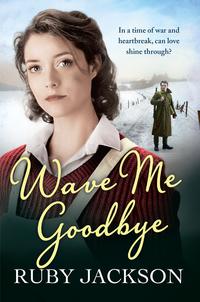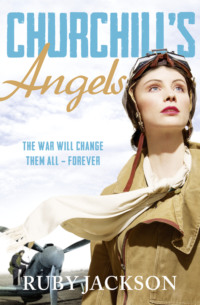
Полная версия
A Christmas Gift
Sally hurried to the kitchen. This, at least, she could do.
‘Sorry I forgot, love, there’s a letter for you, typed address, in the dresser drawer; didn’t want it to get covered in flour when I was baking.’
Sally, who had just taken the box of matches down from the shelf, dropped it, turned and pulled open the drawer. Her mother, still in the bathroom, smiled as she heard her rip open the letter.
The door opened and Ernie Brewer came in just as Elsie gave her head a final pat and walked into the kitchen where the milk was still cold on the stove. She lit the gas and waited while Sally finished the letter. While her parents stood watching Sally smiled broadly and read the letter again.
She finished, clutched the letter to her breast, threw her arms round her uniformed father, who was closest, and shouted, ‘I’ve got a job.’
Her doting parents were not surprised when their daughter burst into loud but happy tears. Elsie made cocoa while she waited for the ever-emotional Sally to be calm and at last all three were able to sit down and talk.
‘It’s from Oliver, Mr Dantry. He says he talked to a friend of his in the Dartford Rep and, even though the theatre is dark –’ she looked at her parents to see if they understood the term – ‘they’re willing to take me on as an apprentice. Learning from the ground up, he calls it. I’ll have to do everything: look after props, keep scripts in order, help with costumes, scenery too, if they think I’m any good, even make tea for the professional cast. I can start immediately, tomorrow if I want.’
‘Very kind of Mr Dantry to think of you, Sally, but actually I’ve just heard some good news too.’
Eyes wide, Ernie’s wife and daughter looked at him.
Elsie spoke first. ‘Oh, Ernie, it’s not …?’
He was too full of emotion to speak but nodded. Then, once again in control of himself, said, ‘Tomorrow, love, all cinemas and places of entertainment are to reopen. I know it’s been only a few days but some big wigs ’as managed to show the Government what a stupid thing closing us down was in the first place.’
‘Oh, Dad, that is fantastic news. You’ve got a job again.’
‘And so do thousands of other people all over the country, even you, love, if you ever need it.’
Sally looked at him pityingly. ‘Daddy, I’ve got a chance to become an actress, but if you need me on my days off I’ll come in and give you a hand.’
‘And get to watch the film in return, little minx. Bet in a thousand years you’ll never guess what film we’ve been promised soon as it’s available.’
Sally stood up. ‘Let me get you more cocoa.’
‘Sorry, love, duty calls. You two, don’t wait up.’
‘What film?’ called Sally, but the only reply was a laugh and the sound of a closing door.
Next morning Sally went to the little theatre to find the few surviving members of the company sharing a bottle of sparkling wine. Elliott Staines, the director and – usually – leading man, introduced Sally and even gave her a small glass of wine. Everyone was in a state almost of euphoria. Three young actors had joined up as soon as war was declared, two box office staff had been evacuated; the cleaning staff had been dismissed when the order to close had been received and so the company was sadly depleted.
‘It’ll get worse,’ Paul Ridley, the second director complained. ‘No offence, Sally, but that’s why we were so glad to get you. I doubt we’ll keep you long – Churchill will want you in the services – but while you’re here, we’ll work you to death. Believe me, a rep is the best place to learn your craft.’
Sally believed him and, for some time, had never been happier. She loved the smell of the theatre. Without the cleaning staff, dust and dirt were everywhere. Their smells mingled with the lingering perfumes of stage make-up, stale sweat, coffee, cigarette smoke, even beer, and Sally, newest member not of the cast but of the workforce, spent hours cleaning. It was not as she had pictured her first position but she reminded herself that at least she was actually working in the theatre.
She could smile now when she remembered her first theatrical experiences, those early days of endless hours of ironing frilled shirts or lace jabots, hours of cranking out pages of scripts on the ancient stencil duplicator, and of finding, to her stunned surprise, that she had a talent for designing and painting scenery. Less productive hours were spent making and serving endless cups of tea that in time grew weaker and weaker as rationing marched across the land.
It wasn’t too ghastly, she mused now. I read every script and memorised almost all the words. I learned to judge what was good and what was so-so and what was just plain bad acting. I must have been the best-read skivvy in the history of English theatre. And I met Sebastian, and I fell in love.
Early December 1939
‘The Theatre Royal?’ she repeated.
Elliott Staines smiled at her. ‘Of course, darling. The Theatre Royal, Drury Lane. Actually, my chum Connie Marshall has a teeny part – vitally important, naturally.’ He held up an envelope. ‘And she’s sent me two tickets. Do come; vitally important for you to see and be seen.’
‘Vitally important’ – Elliott’s favourite words.
‘Elliott, you are kind. I’d love to but … my parents tend to worry, especially if I’m out late. We’d be really late getting back, wouldn’t we?’
He looked at her sadly. ‘Dahling, was I misinformed? They assured me that we were hiring an adult, a woman of the world. Come on, London’s not very far away. We’ll take my car; up and back in three shakes.’
Sally felt deeply embarrassed: a child who needed Daddy’s permission to do anything. Her parents had heard of Elliott. When she had told them excitedly that a real actor, who had been in a film and had acted in theatres in London, was both the senior actor and co-owner of the theatre, her father’s tone told her nothing of his opinion of the actor.
‘Well, what d’you think of that, Elsie? Elliott Staines, of all people? Goodness, he used to be famous; come down in the world a bit, hasn’t he?’
Elliott’s sarcasm had made her blush but she promised to ask her parents’ permission. Knowing perfectly well that she would get it, she decided to run around in her lunch break looking for a dress suitable for a visit to the Theatre Royal, on Drury Lane, a theatre whose name she saw in huge capitals in her mind. Elliott hadn’t exactly said, but surely his friend would say hello. There were one or two experienced actors in Dartford Rep but Constance Marshall, Elliott’s chum, was known worldwide. As a young actress, Constance had been famous for her portrayal of Shakespearean heroines; in later years she had played queens but now she tended to appear in small character parts. To meet her would be so exciting and Sally was sure that there was absolutely nothing in her very well-stocked wardrobe elegant enough to be worn in a London theatre.
She was passing the second-hand clothes shop on the High Street that had recently been opened by the WVS when, in the large picture window she saw, not a dress but a cloak. A cloak designed for magical evenings, for nights at the opera, for moonlit strolls, and certainly it was perfect for wearing by an aspiring actress who wanted – needed – to be noticed.
‘Mum’ll have a fit,’ said Sally to herself as she walked in. She had never been in the second-hand shop where her friend Grace’s sister worked but she knew immediately that this was a very different place. The single room was large, airy and spotlessly clean. The clothes were hanging on racks that were not too crowded, the better to show off each item. Even the two women who stood one behind the counter, the other primping a rather dashing hat on a stand near the window, were different. It was obvious that neither would ever need to buy from a second-hand shop.
‘May I help you?’ asked the one behind the counter and her voice reinforced what Sally had just been thinking. She wondered now if she could learn to speak like the lady. That accent would be perfect for some parts.
‘I’d like to see the blue cloak in the window, please.’
‘Exquisite, isn’t it? Maude, you’re closer. Be an angel and bring the young lady the evening cloak.’
‘In a jiff, Fedora.’ Maude’s voice was pleasant but not in the same league as that of the elegant Fedora.
Sally tried to memorise the sounds – as well as the strange name.
And then, somehow she was before a mirror and the cloak was on her shoulders. The blue of the velvet made her eyes appear bluer, deeper and brighter than ever. Whatever it cost, she had to own this wonderful cloak.
‘What a picture,’ said Fedora. ‘Honestly, Maude, doesn’t it look as if it was made for her?’
Maude looked at Sally, seeing her neat skirt, well-ironed blouse and hand-knitted cardigan. ‘Not frightfully practical, but yes, very lovely. For something special, may I ask?’
Sally had been bursting to tell someone, anyone. ‘I’m going to London, to the Theatre Royal, actually; it’s more or less on Drury Lane. I’m a guest of Miss Constance Marshall.’
‘Good heavens, surely all theatres closed a few days after war was declared?’ said Maude. ‘And as for Connie Marshall, I thought she retired years ago.’
‘Obviously not.’ Fedora turned to Sally. ‘Forgive Maude, she’s decided not to read the newspapers until the end of this ghastly war.’ In a louder voice she added, ‘The theatres have been reopened, Maude.’ She turned back to Sally. ‘That does sound like a perfectly lovely evening, my dear. I’m afraid the cloak is rather expensive. It’s by a top designer, and the money is going to war charities.’ She looked as if she was at war with herself.
‘We’ve had it three weeks and no one has even looked at it,’ Maude reminded her.
‘Two pounds ten shillings,’ said Fedora at last. ‘I know that’s a lot but I can’t let it go for less.’
Sally had winced but she had to have the cloak. It was as if the designer had had her in mind when he had created it. ‘I have five shillings in my bag but I have the rest in my Post Office account.’ She fished her purse out of her bag and emptied the coins it contained onto the counter. ‘Could I put this as a down payment, please? I have to go back to work now but I’ll take the money out tomorrow. Honestly, I will come back.’
‘I can’t let you take it with you, dear, not without payment.’
‘I understand, but please take my five shillings – a deposit, as it were. I swear I’ll come back tomorrow with the rest.’
‘Of course we’ll take it. The cloak was made for you, wasn’t it?’ said Maude.
A few minutes later, Sally, feeling as light as a soap bubble, left the shop and hurried back to the theatre. Her father would be unhappy about the amount of money she had spent on a cloak for one evening but he would also say that it was her own hard-earned money and, if she chose to waste it, that was entirely up to her.
Neither parent had been particularly happy about her going to a London theatre with an actor older than her own father.
‘Of course, seeing and hearing Ivor Novello is quite wonderful, pet,’ said Elsie, ‘but we just don’t like the idea of our young daughter being alone with this man, with any man.’
‘Mum, he’s my boss and he was famous once – even you and Dad know that. And I’ll only be alone with him while he’s driving us to London and back again right after the performance. Don’t spoil this, please. What if I actually meet Miss Marshall?’ She dreamed of meeting Novello, the star, but surely that was much too wonderful even to mention.
‘Very nice, I’m sure,’ said Bert. ‘I think we should let her go, love,’ he turned to his daughter, ‘but he picks you up here, Sally, and he’ll shake my hand and tell me exactly what time you’ll get home – and it had better be not long after the play ends.’
Just over two weeks later, Sally sat, a mere five rows from the stage of the Tamise Theatre, admiring the classic profile of the world-famous Ivor Novello as he starred in his own musical The Dancing Years. Only now, towards the close of the performance, was she able to breathe properly, for Fedora had been perfectly correct and the production had been forced to change theatres early in September. Elliott had been so sure of himself that he had never examined the tickets and had driven to Drury Lane to find the theatre completely deserted. There he lost his temper and shouted some words that Sally was glad she did not understand, but recovered in time to drive to the Tamise Theatre where he again embarrassed Sally by pushing his way through the waiting crowds.
At last she was relaxed after twice resorting to pinching her arm to assure herself that she was indeed in a London theatre, that she was enveloped in a strikingly lovely blue velvet cloak, and that the great man himself had actually spoken to her.
She’d been so excited to meet Connie Marshall, who was rather grand and gracious. It was just before curtain up, and visitors shouldn’t have been backstage, but Connie found time to ask Sally very kindly about her theatrical career and Sally was saved from revealing the disappointing truth when her mouth literally dried up at the sight of the great – and very handsome – star of musical theatre approaching behind the elderly actress.
‘Enjoy, poppet, sorry, got to fly,’ was all he had said as Connie quickly introduced Sally, but he had spoken to her and she would never forget it.
She wished she could forget Elliott’s closeness. His right hand strayed several times to her knee and when she had joked that she needed to pinch herself, she had not liked the tone of his voice when he said that he would be delighted to do the pinching. As the evening wore on she became more and more sure that she had made a dreadful mistake in accepting the older actor’s invitation. She almost wept as she realised that had she not accepted, one of the most famous men in the entire world of musical theatre would never have smiled at her or spoken to her.
The curtain went down. The theatre exploded with cheers and clapping and stamping feet as the audience stood up. Back came the cast, bowing modestly, kissing flowers that were thrown and often sending them back to the original thrower. It was wonderful, but at the back of Sally’s mind was a band of cold fear.
He’ll take me straight home, she told herself. He promised. Everything will be all right.
‘Come along, darling. We’re going backstage for drinkies.’
‘But it’s late, Elliott, and you said we’d leave after the performance.’
‘And we will, sweet child, but first we have to do the polite, you know. Must get rid of the black mark I earned. We’ll pop in on old Connie again – she is a darling, isn’t she? Can’t think of anyone else who would risk Ivor’s wrath just before a performance but then, she is so terribly fond of me. If he’s not too besieged, we’ll see darling Ivor and have some champers. Ever had champers, Sally B?’
Champagne was not something ever served in the Brewer house. How exciting. It was a dream … except for that niggle of worry. But, of course there would be no problem; they worked together. Elliott was merely being theatrical and silly.
‘I can’t stay long, Elliott. My parents will worry.’
‘You’re not a child, Sally. Silly girl. Here we are.’
Seeing that the great man’s dressing room was already packed full, Sally turned to leave but Elliott held her hand painfully and pulled her along behind him through the crowd.
The air rang with cries of ‘Dahling’, ‘Wonderful’, even ‘Mahvellous!!’ The practical Petrie twins would be amazed to learn that ‘Mahvellous’ and ‘Dahling’ were actual words, Sally thought.
‘Wherever did you find this perfect little peach, Staines?’
Sally heard the question and at the same time felt an arm going around her waist. ‘Stop that,’ she began, but she felt herself being pulled even closer to a large man in a scarlet evening jacket.
‘What a beauty,’ the voice continued as the man’s other hand began to rove over Sally’s back and down her hips. ‘Yum, yum, you can’t keep her to yourself.’
‘Let go of me,’ Sally, heedless of the fact that she was surrounded by many of the nation’s theatrical stars, hissed out the words, accompanying them with a sharp kick.
The hands dropped immediately but a well-known and heretofore much-admired face pressed itself closer to Sally’s. ‘Oh, I do like a little ingénue with a sparkle.’ One hand grasped Sally’s arm. ‘Go halves, Elliott darling, and I might just be able to …’
Sally looked up into the face of Conrad Blessington and, although she was frightened, angry and disappointed, she noted that the once so-handsome face had developed heavy jowls. There were dark shadows, not of illness, she thought, but of dissipation. Had the actor she had so admired always been as vulgar as the man holding her now?
Sally wrenched herself free and praying, first, that no one had paid any attention, and secondly, that she would not burst into tears, pushed her way past the two men and headed for the door. She gave thought to nothing but the need to get as far away from men like Elliott Staines and his friend as possible.
‘Why, there you are,’ said a voice. ‘I waited an age and had quite given up hope of seeing you this evening.’
A young man – and Sally was not so upset that she did not see that he was extremely handsome – was standing beside her and smiling at her as if they were old friends.
‘Bit of a crush, isn’t it, but super evening? Didn’t you think the last number was absolutely divine?’
Whoever he was, he gave her no chance to reply, not that she was capable of saying anything, but bundled her through the crowd – which parted for him – and out of the star’s dressing room.
‘Sebastian Brady,’ he introduced himself. ‘I take it that I’m correct and you didn’t want to stay with those two old lechers?’
Sally looked up at him, into the perfect face that she and her friends had fallen in love with when he had made his film debut as a prefect in the film Goodbye, Mr Chips.
Sebastian Brady. What must he think of her? Wildly Sally groped for a handkerchief. The young actor pressed his own into her hand.
‘Where do you live?’
‘Dartford.’
‘Bloody hell. Oh, I do apologise. Has to be better than Portsmouth. Is there a late train?’
Sally blew her nose again. ‘I have no idea. Elliott drove us.’
‘So, no train ticket either?’
Tears started in Sally’s eyes. How foolish she felt.
‘You’ll have to trust me then. Straight off, I think you’re a lovely girl but my grandmother brought me up, she trusts, to be a gentleman. Come along. I’ve never been to Dartford. It’ll be good for me.’
‘You do know where it is?’
‘Not the slightest idea.’ He laughed at her worried expression. ‘But I do have a fabulous invention, Miss Expressive Face. It’s called a road map.’
‘Very funny.’
They laughed together. He drove her home and as he negotiated the route he chatted of this, that and everything in between. It was as if they had known each other for ever.
She was embarrassed to see the slightest chink of light through the blackout curtains in her parents’ bedroom.
‘Parents still awake, Sally? Don’t be embarrassed. Be grateful. If I still lived at home, Grandmamma would be sitting up in the library waiting.’
She would have liked to ask about his parents but was still too aware that he was an actual film star. Instead she thanked him sincerely for his kindness. Then they said goodbye. He watched her until she had disappeared into the house. Sally waved and assumed that she would never see him again.
Конец ознакомительного фрагмента.
Текст предоставлен ООО «ЛитРес».
Прочитайте эту книгу целиком, купив полную легальную версию на ЛитРес.
Безопасно оплатить книгу можно банковской картой Visa, MasterCard, Maestro, со счета мобильного телефона, с платежного терминала, в салоне МТС или Связной, через PayPal, WebMoney, Яндекс.Деньги, QIWI Кошелек, бонусными картами или другим удобным Вам способом.





